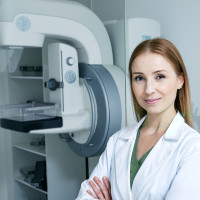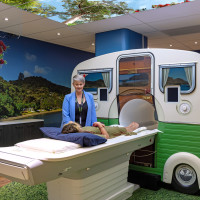Pre Examination
We ask you to not eat for 2 hours before this procedure, but you should still drink clear fluids. If you are diabetic, continue with your normal schedule for food, drink and medication.
Please continue taking your usual medication but refrain from drinking alcohol or caffeine-based drinks (coffee, tea, soft drinks). You are also asked to refrain from taking Cialis, Viagra or Levitra for 2 days before your procedure.
Please ensure you bring all your relevant paperwork in with you for the appointment, particularly your patient questionnaire.
Your Examination
When you arrive at Canopy Imaging at 209 Shakespeare Road, Milford (directly opposite the Shakespeare Road entrance to North Shore Hospital), please report to our main reception.
From reception, one of our friendly team will bring you into another private reception area. Your questionnaire will be checked and any relevant medical history you may have will be discussed. We will take your blood pressure and note your heart rate and potentially take an ECG reading. We will then talk you through the procedure and get you to sign a consent form.
Just before you begin your scan, you'll need to remove clothing above your waist, as well as any jewellery. You will then change into a special gown.
Because your heart is constantly in motion while it beats, our doctor may give you a medication called a beta-blocker to slow your heart rate. This will allow an accurate assessment of the arteries of your heart. Some people have side effects from beta-blockers, such as shortness of breath or wheezing, and particularly in people with asthma or chronic obstructive pulmonary disease (COPD). Please let us know if you have had side effects from beta-blockers in the past.
A technician will insert an intravenous (IV) line in your arm to inject the dye that will make your arteries visible on the images taken by the CT scanner. Sometimes, after the dye is injected through your IV cannula, you may experience a warm flush which is quite normal. Although the actual scanning portion of the test takes a few as 5 seconds, it may take an hour or so for the whole process because beta-blockers need time to slow your heart rate sufficiently.
The technician will place some electrodes on your chest to record your heart rate throughout the exam. When you are ready to be scanned, you will lie on a long table that slides through a short, doughnut-like machine.
A technician will operate the machine and will be in constant contact with you.
It is important to keep as still as possible. You will be asked to hold your breath. Any movement can blur the X-ray images.
Post Examination
After your CT angiogram is completed, you can return to your normal daily activities. You should be able to drive yourself to work or home.
The images from your CT angiogram will be reviewed and analysed by a cardiologist and the findings will be put into a report. The non-heart structures in your chest will also be reviewed and reported by a radiologist. It normally takes up to 7 days to complete this process. Your GP will be kept informed of the procedure, the findings and any recommendations.
Regardless of the results of your test, it is a good idea to make lifestyle changes to help protect your heart. These include:
- Exercise regularly. Exercise helps you reach and maintain a healthy weight and control diabetes, elevated cholesterol and high blood pressure — all risk factors for heart disease. With your doctor's approval, aim for 30 to 60 minutes of physical activity most days of the week. Even if you can't make time for one 30 to 60 minute exercise session, you can still benefit from breaking up your activity into several 10 minute sessions.
- Eat healthy foods. A heart-healthy diet based on fruits, vegetables and whole grains — and low in saturated fat, cholesterol and sodium — can help you control your weight, blood pressure and cholesterol. Eating one or two servings of fish a week also is beneficial.
- Stop smoking. Smoking is a major risk factor for heart disease, especially atherosclerosis. Nicotine constricts blood vessels and forces your heart to work harder, and carbon monoxide reduces oxygen in your blood and damages the lining of your blood vessels. If you smoke, quitting is the best way to reduce your risk of heart disease and its complications.
- Maintain a healthy weight. Excess weight can contribute to high blood pressure, abnormal cholesterol levels and type 2 diabetes. Losing weight lessens these risks. Even a small weight loss of just 5 to 10 percent of your body weight helps reduce your risk.
- Manage health conditions. If you have high blood pressure, elevated cholesterol or diabetes, be sure to take your medications as directed. Losing weight, eating healthy and exercising regularly can help control these heart disease risk factors too. Ask your doctor how often you need follow-up visits.
- Manage stress effectively. Stress can cause your blood vessels to constrict, increasing the risk of a heart attack. Ask your doctor about stress management programmes in your area. Exercise can help reduce stress too.
















